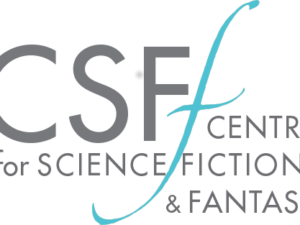
This week’s PhD student profile is of Chandra Clarke.
Tell us about your research!
My project, an SF novel, explores how new technologies are adopted and how they are spread. Of particular interest is why technologies are inevitably adapted into uses unforeseen by their creators, how a single technology can spawn countless cottage industries and mini-ecosystems, and especially how it can generate ethical dilemmas. I’m also interested in the use of science fiction as a tool for exploring the future.
What was your introduction to SFF?/How did you come to SFF?
Honestly, I think I was born a nerd. I remember watching Star Wars and Star Trek at a very young age, and my favourite toys were most decidedly not Barbie dolls, but my spaceships and ray guns. I wasn’t a big reader until about age twelve or so, and then spent my teens exploring fantasy novels when I wasn’t messing about with video games or tinkering with robots.
What does SFF do for you that other genres do not?
I love challenging reads, but when I say that, I don’t mean that I want to slog through dense text so much as I want to have my beliefs and values challenged. I want to consider possibilities and to explore. When done well, SFF takes you out of your ordinary life, puts you down somewhere strange, and demands that you think about something in a new way. A really good SF novel, in my view, should be a thought experiment. What if X happens? What will we do? How will it play out? Will it be good or bad? And for whom? Finally, is the result of this experiment something we should strive for, or guard against? This is what I get from SFF.
Where do you see SFF going in the next 10 years? 20 Years?
In the near term, quite a lot of it is probably going to be dedicated to the fallout from climate change and populism. What I hope to see in the longer term, and what I try to write, is what might be on the horizon beyond that. It’s hard for a lot of people to be optimistic right now, because we have these concentrated groups of very short-sighted people electing incredibly myopic leaders into power, at a time when we really need to be getting our act together on some global problems. So, I feel my job as a writer is to present viable alternatives to the current morass. What might a more just and equitable future look like? How can we use the tools we’ve created properly and for the greater good? Dystopias, techno-thrillers, these things are useful as cautionary tales, but we also need some critical utopias to work toward as a society.
What overlooked or lesser known works would you recommend to readers and academics and why?
Not lesser known, but I’ve been diving into utopian studies as there’s a lot of intersection with SFF criticism. In particular, the work of Ruth Levitas, e.g., Utopia as Method: The Imaginary Reconstitution of Society, has been very interesting.
For more info about Chandra and her publications, you can visit her bio on the Members page.



